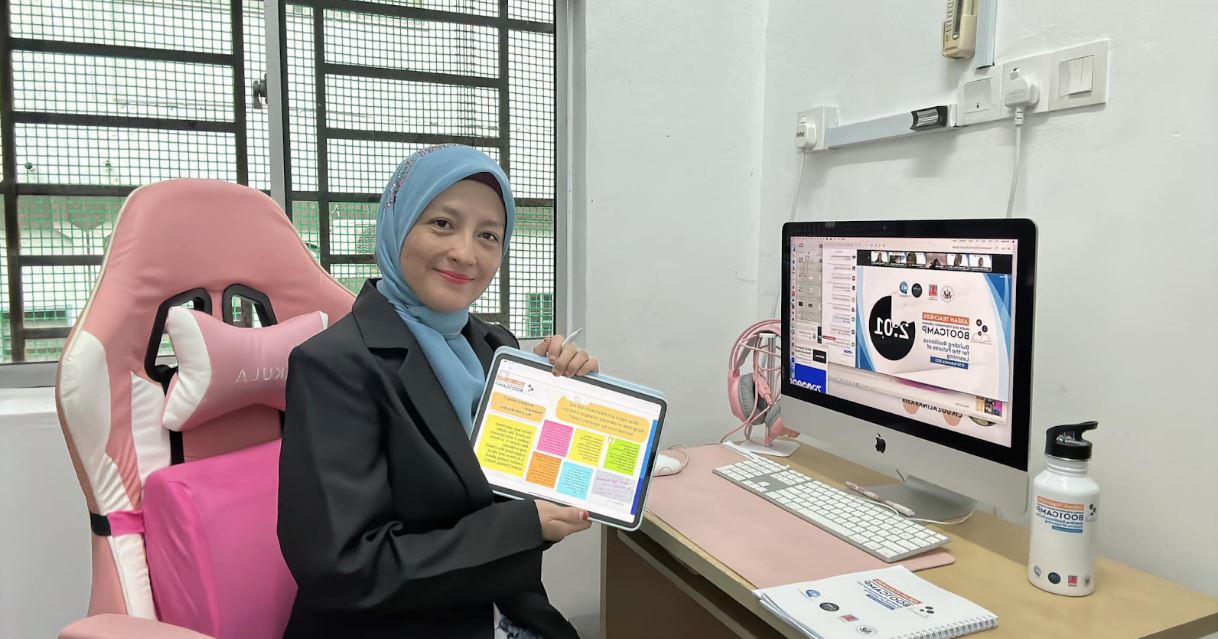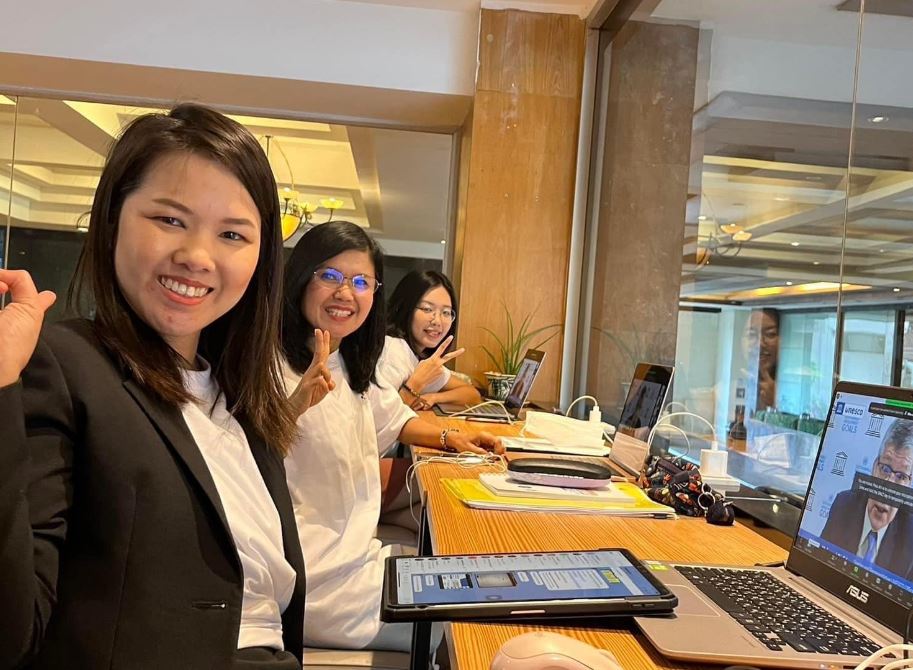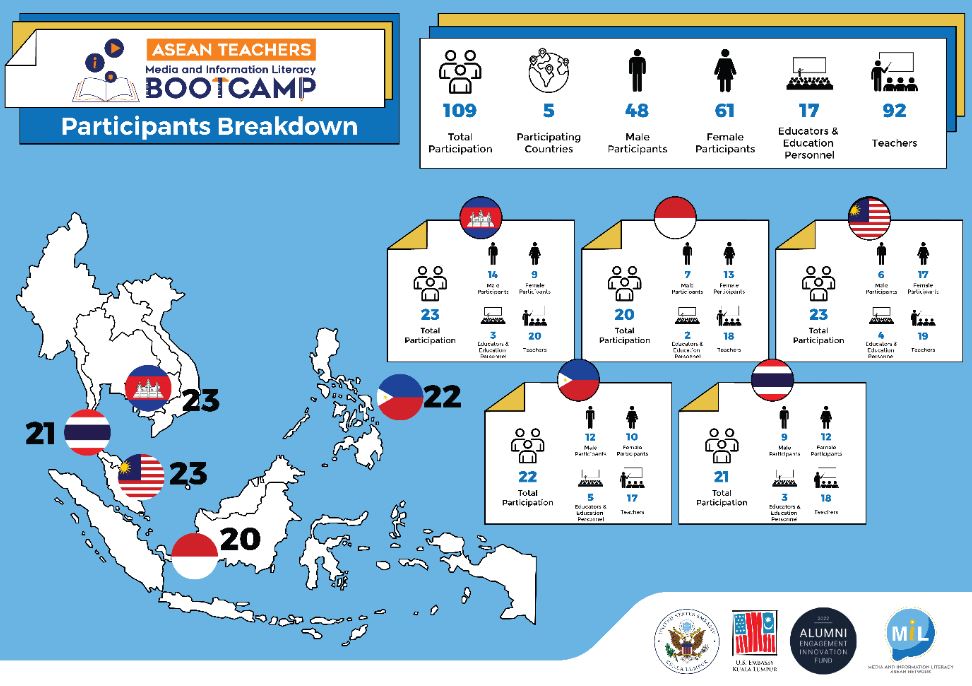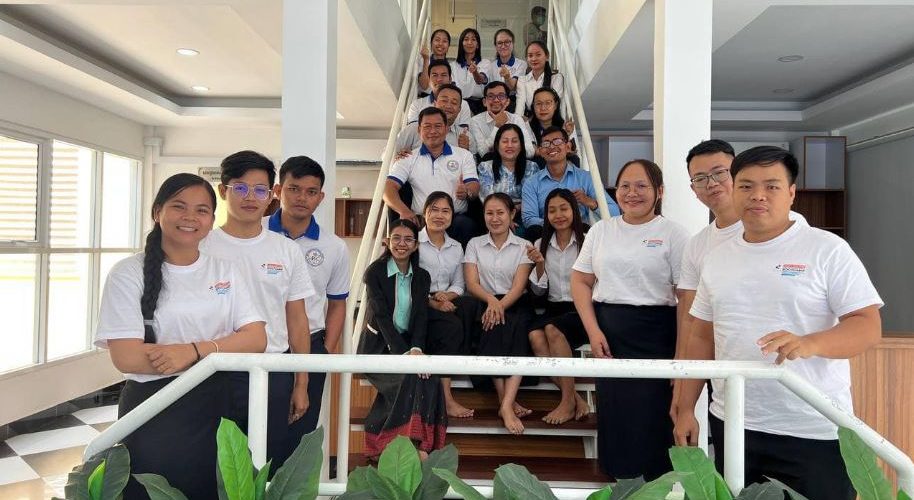The US Department of State’s exchange alumni hosted a Boot Camp for ASEAN teachers and educators from February 8 to 10, assisting them in honing their media and information literacy skills and competencies.
Funded by the U.S. Department of State’s Alumni Engagement Innovation Fund (AEIF) and the U.S. Embassy Kuala Lumpur, the ASEAN Teachers Boot Camp provided online training on media and information literacy to more than 100 teachers and educators from five ASEAN member countries.
The Boot Camp focused on “Media and Information Literacy: Building Resilience for the Futures of Learning.” Teachers from Cambodia, Indonesia, Malaysia, the Philippines, and Thailand participated in the Boot Camp.
Organized by Media Information and Literacy (MIL) for ASEAN Network, a network of Media and Information Literacy educators and advocates, the online training program equipped teachers and educators with the knowledge, skills, and strategies they need to become effective ambassadors of digital resilience.

Fostering a truth-based society
In his opening remarks, U.S. Ambassador to Malaysia, Brian D. McFeeters said, “Disinformation and a lack of media literacy pose threats to societies around the world.”
He stressed the important role played by teachers and educators in fostering a truth-based society.
“You understand how the information environment impacts youth in your communities; your guidance and interventions when it comes to media literacy have the potential to reduce radicalization, limit hate speech, and equip youth to not only protect themselves but to act as champions of media literacy in their communities. So, now is the right time for us to equip ourselves with media literacy skills and best practices,” Ambassador McFeeters said.
The Ambassador also commended the work of three former participants in U.S. government-funded and sponsored programmes who organised the Boot Camp: Wong Lai Cheng from Malaysia, Melinda Quinones from the Philippines, and Bunnath Phann from Cambodia.
“Despite the 1,000-mile geographic distance between the three of you, you have come together, capitalized on the opportunities available to benefit your communities, and demonstrated how we can all work across borders for the mutual benefit of all,” Ambassador McFeeters said.
“We always like to have people participating in our programs to come back and give us ideas, and this [Boot Camp] is a great example of that,” Ambassador McFeeters said.

Think Critically, Click Wisely
Mr. Mohamed Djelid, Director of the Regional Bureau for Sciences in Asia and the Pacific in Jakarta, Indonesia, and UNESCO Representative to Indonesia, Brunei Darussalam, Malaysia, the Philippines and Timor-Leste thanked the U.S. Embassy Kuala Lumpur for supporting this endeavour and highlighted the role of educators in guiding the youth in developing critical thinking and media literacy skills.
“While the proliferation of digital technologies has been empowering and enriching for many, it has also given way to massive disinformation, hate speech and other forms of harmful content that are very damaging to youth well-being and civic participation. Youth are the most active users online and yet they are often unaware of their rights and responsibilities in cyberspace. This is why UNESCO supports the integration of Media and Information Literacy in national policies and strategies as well as school curricula.” Mr Djelid added.
“We are very pleased to know that the ASEAN Teachers Boot Camp will be using the recently published second edition of the UNESCO MIL Curriculum for educators and learners, entitled “Think Critically, Click Wisely!”. It gives concrete ideas and tools for integrating Media and Information Literacy across subjects and class levels.” Mr Djelid commended the Secretariat.

Integrating Media and Information Literacy in the classrooms
The ASEAN Teachers’ Boot Camp was aimed to expand the participants’ knowledge and competencies to integrate MIL across the curriculum and develop the critical thinking skills of students so that they can actively engage with different segments of society.
The more than 100 participating teachers and educators took part in intensive seminars and discussions on topics related to MIL, such as strategies to counter media misinformation and disinformation in a modern classroom, fact-checking, strategies to develop student digital detectives in a post-truth era, data privacy and protection, Internet safety, and deep fakes detection.
Tessa Jolls, President and CEO of the Center for Media Literacy, led the first day of the ASEAN Teachers’ Virtual Boot Camp as she provided an overview of media and information literacy and transitioning these concepts from theory to practice.
Dr. Kari Kivinen, Education Outreach Expert of the European Union Intellectual Property Office mentioned how despite today’s youth being called “digital natives,” some still lack the practice of critical thinking in terms of digital use, making them prey to misinformation and disinformation.
On the final day of the programme, participants had the opportunity to pitch their solutions to countering media disinformation in a modern classroom and by developing an individual action plan.
“When teachers integrate Media and Information Literacy (MIL) in their classrooms, they provide students the critical skills to understand the media surrounding them and develop them to become active consumers of information, determine credible sources, acknowledge biases in media, and be responsible creators of media” Lai Cheng Wong, Organizing Co-chairperson said, expressing that education is the best way to create media and information-literate societies.
When asked about her experience at the ASEAN Teachers Boot Camp, Boon, a secondary school teacher from Penang, Malaysia said, “Deepfake, deep nostalgia, misinformation, disinformation, debunking, fact-checking, digital detectives in a post-truth era, those are big words that are completely new to me. After attending this Boot Camp, it expanded my knowledge and competencies on MIL. Hopefully I can integrate MIL across curricular and develop the critical thinking capacity of my students.”

Championing responsible media practices
Inspired by their TechCamp Malaysia 2020 (a public diplomacy program hosted in the Bureau of Educational & Cultural Affairs (ECA) at the U.S. Department of State) mentors to pitch a project that would create a multiplier effect, these alumni formed the MIL for ASEAN Network. The aim of the network is to work with other like-minded individuals and teachers who are passionate about championing responsible media practices, to curb the worrying phenomenon of sharing misleading and inaccurate information; create quality, non-biased content; and develop MIL competencies of teachers and educators in the Southeast Asia region.
The initiative was supported by UNESCO MIL Alliance, Kampuchea Action to Promote Education (Cambodia), SEAMEO Regional Centre for Education in Science and Mathematics (Malaysia), SEAMEO Regional Open Learning Centre (Indonesia), Polytechnic University of the Philippines and Centro Escolar University (Philippines), and Rangsit University (Thailand).
Alumni Engagement Innovation Fund (AEIF) provided funding to alumni of US-sponsored and facilitated exchange programs to build on the skills they gained during their exchange experience and design and implement innovative solutions to global challenges confronting their community.











